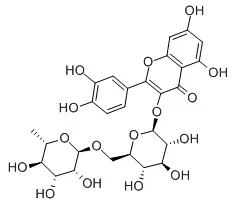What antioxidant functions does rutin powder provide?
2025-11-12 11:52:42
With remarkable antioxidant properties, rutin powder is a potent plant ingredient. Because of its capacity to protect cells from oxidative damage and neutralize dangerous free radicals, this flavonoid—which is present naturally in a variety of fruits and vegetables—offers a range of possible health advantages. Learn more about rutin powder's antioxidant properties and how they might help your health in this detailed guide.

Free radical scavenging mechanisms of rutin powder
One of the primary antioxidant functions of rutin powder is its ability to scavenge free radicals. Free radicals are unstable molecules that can damage cells, proteins, and DNA, contributing to oxidative stress and various health issues. Rutin acts as a potent free radical scavenger through several mechanisms:
Direct neutralization of reactive oxygen species
One of the most well-established antioxidant actions of rutin powder lies in its ability to directly neutralize reactive oxygen species (ROS). These highly unstable molecules, such as superoxide anions, hydroxyl radicals, and singlet oxygen, can rapidly react with cellular components, leading to lipid peroxidation, DNA damage, and protein denaturation. Rutin acts as an electron donor, stabilizing these reactive species by converting them into less harmful compounds. The presence of multiple hydroxyl groups in rutin's flavonoid structure enables it to effectively quench free radicals and terminate oxidative chain reactions. Studies have demonstrated that rutin exhibits strong scavenging activity comparable to well-known antioxidants like quercetin and ascorbic acid. This direct neutralization mechanism helps maintain cellular integrity and supports overall health by reducing oxidative damage in tissues, particularly in the cardiovascular and nervous systems, where oxidative stress is a key contributor to aging and disease development.
Metal chelation properties
In addition to its direct radical-scavenging capabilities, rutin exhibits strong metal chelation properties that further enhance its antioxidant potential. Transition metals such as iron (Fe²⁺) and copper (Cu²⁺) can catalyze the Fenton and Haber–Weiss reactions, producing highly reactive hydroxyl radicals from hydrogen peroxide. By binding to these metal ions, rutin effectively prevents them from participating in such reactions, thereby reducing the overall generation of reactive oxygen species. The catechol and hydroxyl groups in rutin's molecular structure provide multiple binding sites for metal coordination, forming stable complexes that deactivate the metals' catalytic activity. This chelation mechanism not only minimizes oxidative stress but also protects lipids, proteins, and nucleic acids from metal-induced oxidation. Moreover, rutin's metal-chelating ability may play a role in reducing heavy metal toxicity in the body, contributing to its broader protective and detoxifying health effects.
Regeneration of other antioxidants
Beyond its direct and indirect antioxidant actions, rutin powder contributes to the body's defense system by regenerating other vital antioxidants. During the process of neutralizing free radicals, antioxidants such as vitamin C and vitamin E become oxidized and temporarily lose their activity. Rutin has been shown to restore these oxidized forms back to their active states by donating electrons or hydrogen atoms, effectively recycling them for continued use. This regeneration process enhances the overall antioxidant network within the body, creating a synergistic protective effect against oxidative damage. Research suggests that rutin helps maintain higher intracellular concentrations of vitamin C, amplifying the body's ability to combat oxidative stress. This cooperative interaction not only improves cellular resilience but also supports immune health, vascular function, and skin protection. In essence, rutin acts as both a direct scavenger and an antioxidant regenerator, reinforcing the body's natural defense system at multiple biochemical levels.
Rutin as a protective antioxidant system
Beyond its direct free radical scavenging abilities, rutin powder serves as a protective antioxidant system in the body, offering various benefits:
Cellular membrane protection
Rutin helps protect cellular membranes from lipid peroxidation, a process in which free radicals attack and damage the lipids in cell membranes. By preserving membrane integrity, rutin supports overall cellular health and function.
DNA protection
Oxidative stress can lead to DNA damage, which may contribute to various health issues and accelerated aging. Rutin's antioxidant properties help shield DNA from oxidative damage, potentially reducing the risk of mutations and supporting genomic stability.
Protein oxidation prevention
Proteins are essential for numerous bodily functions, and oxidative damage to proteins can impair their activity. Rutin helps prevent protein oxidation, thereby maintaining the proper function of enzymes, structural proteins, and other vital protein molecules in the body.
Enhancing vascular integrity and function
One of the most significant antioxidant functions of rutin powder is its ability to support vascular health. Rutin's protective effects on blood vessels include:
Strengthening capillary walls
Rutin helps strengthen and increase the flexibility of blood vessel walls, particularly capillaries. This can improve overall circulation and reduce the risk of vascular fragility.
Reducing inflammation
The anti-inflammatory properties of rutin contribute to vascular health by reducing inflammation in blood vessel walls. This may help prevent the development of atherosclerosis and other cardiovascular issues.
Improving endothelial function
Rutin supports the health and function of the endothelium, the inner lining of blood vessels. By protecting endothelial cells from oxidative damage, rutin may help maintain proper blood flow and vascular function.
Rutin bioavailability enhancement methods
While rutin offers numerous antioxidant benefits, its bioavailability can be limited. Here are some methods to enhance the absorption and effectiveness of rutin powder:
Nanoencapsulation
Encapsulating rutin in nanoparticles can significantly improve its bioavailability. This method protects rutin from degradation in the gastrointestinal tract and enhances its absorption into the bloodstream.
Combination with other antioxidants
Combining rutin with other antioxidants, such as vitamin C or quercetin, can create synergistic effects and improve overall absorption and efficacy.
Liposomal formulations
Liposomal rutin formulations can enhance bioavailability by protecting the compound from degradation and facilitating its transport across cell membranes.
Daily dosage recommendations for benefits
While there is no established recommended daily allowance for rutin, research suggests certain dosage ranges may provide antioxidant benefits:
General antioxidant support
For general antioxidant support, doses ranging from 500-1000 mg per day have been studied. However, it's important to note that individual needs may vary.
Vascular health
For supporting vascular health, some studies have used doses of 500-1000 mg of rutin daily, divided into two or three doses throughout the day.
Consultation with healthcare providers
It's crucial to consult with a healthcare professional before starting any new supplement regimen, including rutin powder. They can provide personalized recommendations based on individual health status and needs.

Conclusion
Rutin powder offers a broad spectrum of powerful antioxidant functions that play a significant role in supporting overall health and wellbeing. Beyond its well-known ability to neutralize harmful free radicals, rutin also contributes to maintaining vascular integrity, reducing inflammation, and protecting cellular structures from oxidative damage. This naturally occurring bioflavonoid works synergistically with other antioxidants, such as vitamin C, to strengthen the body's defense against environmental and metabolic stressors. Moreover, rutin's antioxidant properties have been linked to improved circulation, enhanced capillary strength, and potential cardiovascular benefits, making it valuable for both preventive and therapeutic applications. By understanding the underlying mechanisms and health-promoting potential of rutin, individuals can make informed decisions about integrating this potent natural compound into their daily nutrition or supplement regimen to support long-term vitality and cellular protection.
FAQ
1. Can rutin powder interact with medications?
Rutin may interact with certain medications, particularly blood thinners. It's essential to consult with a healthcare provider before taking rutin supplements, especially if you're on any medications.
2. Are there any side effects associated with rutin powder supplementation?
While generally considered safe, some individuals may experience mild side effects such as headaches, flushing, or gastrointestinal discomfort. If you experience any adverse effects, discontinue use and consult a healthcare professional.
3. How long does it take to see the antioxidant benefits of rutin powder?
The time frame for experiencing rutin's antioxidant benefits can vary depending on individual factors and the specific health concern. Some people may notice improvements in a few weeks, while others may require longer-term supplementation to see significant effects.
Experience the Power of Premium Rutin Powder with YTBIO
You can trust YTBIO to provide you with high-quality rutin powder that is derived from plants. Rest certain that you will get a pure and powerful product to meet your antioxidant requirements, thanks to our unwavering dedication to quality. The organic certifications and stringent quality control procedures that YTBIO employs set it apart as a premier rutin powder supplier. Get started on the path to better antioxidant support by trying our premium rutin powder. Contact us today at sales@sxytorganic.com to learn more about our products and how we can meet your specific requirements.
References
1. Ganeshpurkar, A., & Saluja, A. K. (2017). The Pharmacological Potential of Rutin. Saudi Pharmaceutical Journal, 25(2), 149-164.
2. Chua, L. S. (2013). A review on plant-based rutin extraction methods and its pharmacological activities. Journal of Ethnopharmacology, 150(3), 805-817.
3. Sharma, S., Ali, A., Ali, J., Sahni, J. K., & Baboota, S. (2013). Rutin : therapeutic potential and recent advances in drug delivery. Expert Opinion on Investigational Drugs, 22(8), 1063-1079.
4. Gong, G., Qin, Y., & Huang, W. (2018). Anti-thrombosis effect of rutin and its application prospects: A review. Food and Chemical Toxicology, 119, 1-9.
5. Hosseinzadeh, H., & Nassiri-Asl, M. (2014). Review of the protective effects of rutin on the metabolic function as an important dietary flavonoid. Journal of Endocrinological Investigation, 37(9), 783-788.
6. Wang, S., Wang, Y., Pan, M. H., & Ho, C. T. (2017). Anti-obesity molecular mechanism of soy isoflavones: weaving the way to new therapeutic routes. Food & Function, 8(11), 3831-3846.
_1737093401309.png)
